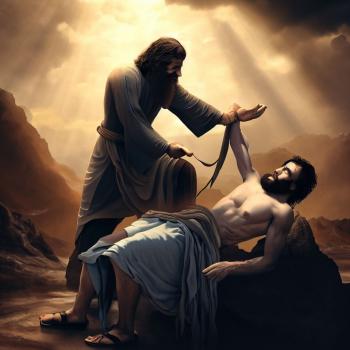
The binding of Issac is a difficult story for many people. Why would Abraham be asked to sacrifice Issac, his son? What was G-d doing? Is this a test? Is this a lesson? Did Abraham hear a voice of someone other than G-d? These are all valid questions, and I think, perhaps, I have the answer.
G-d Tempted Abraham
The story begins with the words G-d tested Abraham. A more accurate translation of the Hebrew is G-d TEMPTED Abraham. The question then naturally becomes tempted him how? Why would Abraham be tempted to murder his own son? To answer this question, we have to know some history.
Why Was Abraham Asked to Sacrifice Issac? To Change Abraham’s Worldview
Many early religions that existed at the same time and prior to the Israelites practiced human sacrifice. Often the sacrifice was a child. Thus the warning, “Do not give your children to Molech.” Molech’s worship often involved temple prostitution with young boys as we have discussed in other articles, but it also often involved the sacrifices of children.
This would have been the kind of relationship between a human and a god that Abraham would have been familiar with. However, our G-d wanted a different kind of relationship and covenant. He did not want his people to sacrifice human children for him. So, he tempted Abraham to see if Abraham would follow the old ways of the pagans. Why was Abraham asked to sacrifice Issac? So, G-d could teach Abraham that this was not his way and that their covenant would be unlike the covenant of the pagans and their idols. G-d tempted Abraham to behave in the way of the pagans, so he could teach Abraham that he was better than the pagan gods. G-d tempted Abraham, so the Israelites should never practice such violence.
Abraham Tempts G-d
What follows seems to be Abraham also testing G-d. It seems Abraham knows G-d will not truly allow such a thing. He already knows the lesson G-d is trying to teach him. When Issac begins to notice something is wrong and asks “But where is the lamb for the burnt offering?” (Gen 22:7), Abraham replies, “God himself will provide the lamb for the burnt offering, my son.” (Gen 22:8). This is exactly what happens. So, it seems Abraham KNEW already that our G-d would never require such a thing. However, instead of saying, “G-d, you don’t require human sacrifices like the pagan gods,” Abraham calls G-d’s bluff.
He takes Issac to the mountain, prepares for a sacrifice, and binds him. At this point, G-d cries out, “Do not do anything to him. Now I know that you fear God because you have not withheld from me your son, your only son.” Then a lamb appears tangled in the bush, and Abraham sacrifices the lamb instead of Issac.
Why Was Abraham Asked to Sacrifice Issac? For A New Covenant
In this story, G-d tempts Abraham to the very edge of murder to teach him that human sacrifice is not allowed. Abraham tempts G-d to the very edge of accepting a human sacrifice to remind G-d that his request is out of character and not allowed. Having made a new contract with each other, the two move forward in an everlasting covenant together. G-d says, “I swear by myself that because you have done this and have not withheld your son, your only son, 17 I will surely bless you and make your descendants as numerous as the stars in the sky and as the sand on the seashore. Your descendants will take possession of the cities of their enemies, 18 and through your offspring[b] all nations on earth will be blessed,[c] because you have obeyed me,” (Gen 22: 16-18).
A New and Better World
This story was meant to teach the Israelites that human sacrifice was no longer expected or accepted. The binding of Issac marked the end of human sacrifice for the Israelites. In many ways, it was the beginning of the end of human sacrifice worldwide. For eventually, The Torah was given to the Gentiles, because G-d promised Abraham that his people would be a blessing to all of mankind. From The Torah, the world learned to worship a G-d who did not require human sacrifice.
So, the next time you are tempted to ask, “What kind of G-d asked such a thing?” remember that the only reason you live in a world where you find this unbelievable is because this story happened and because G-d asked such a thing. Why was Abraham asked to sacrifice Issac? G-d taught Abraham that there was a better way so that you might live in a world where this story is unconscionable, instead of in a world where it is the norm.

















